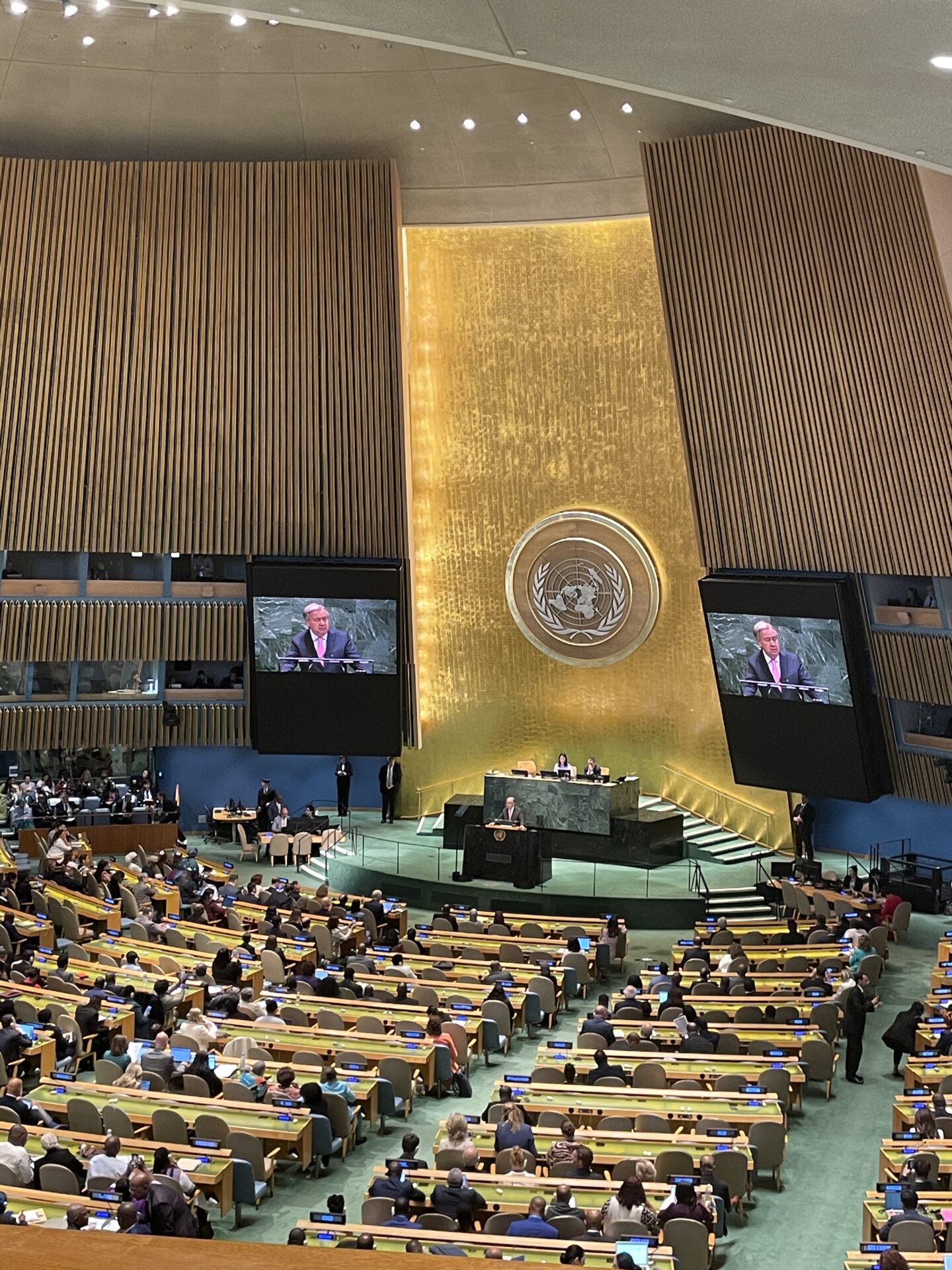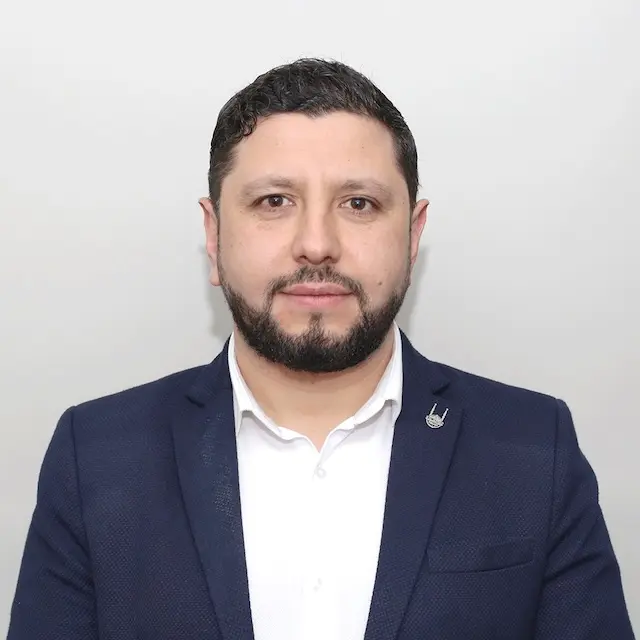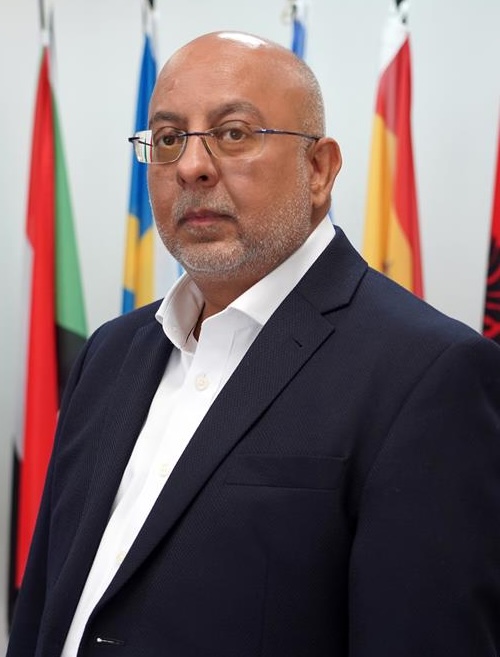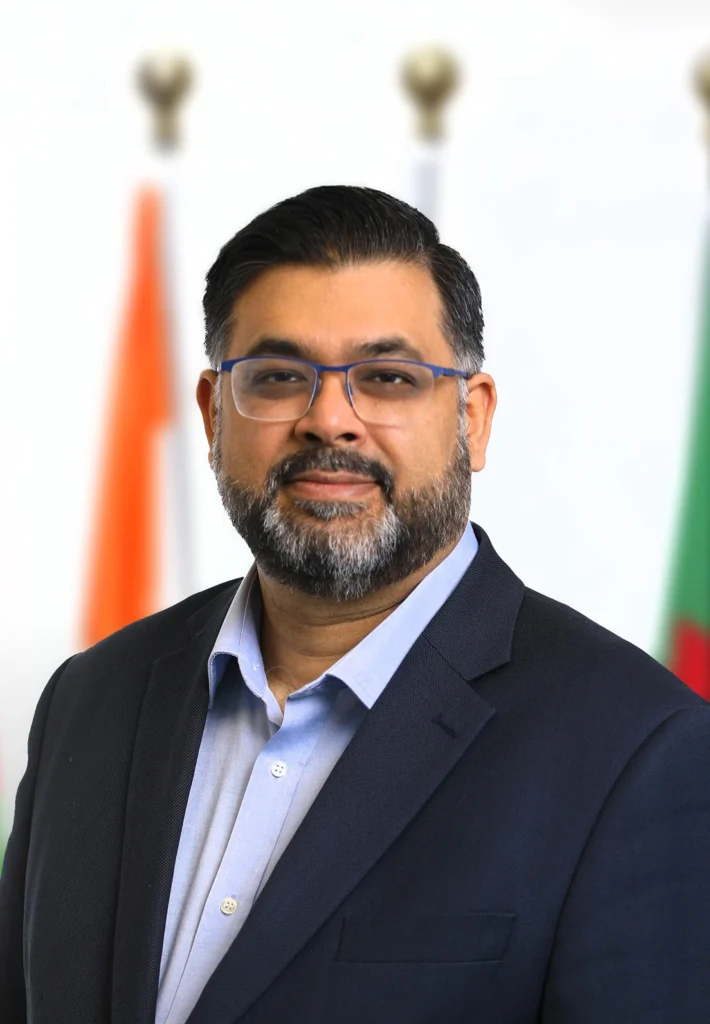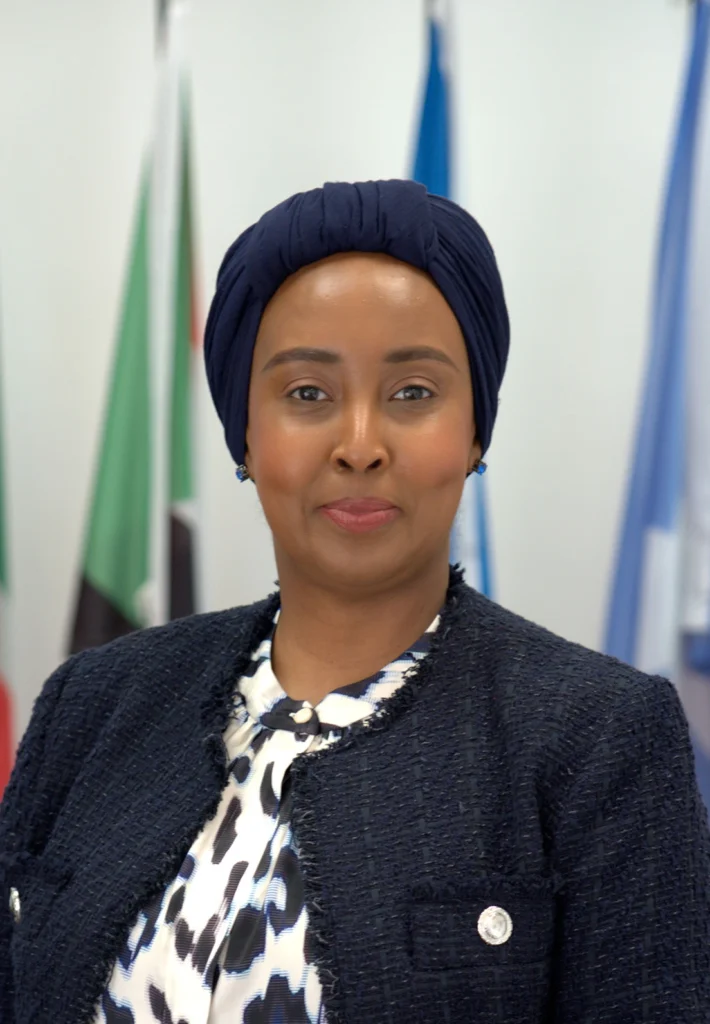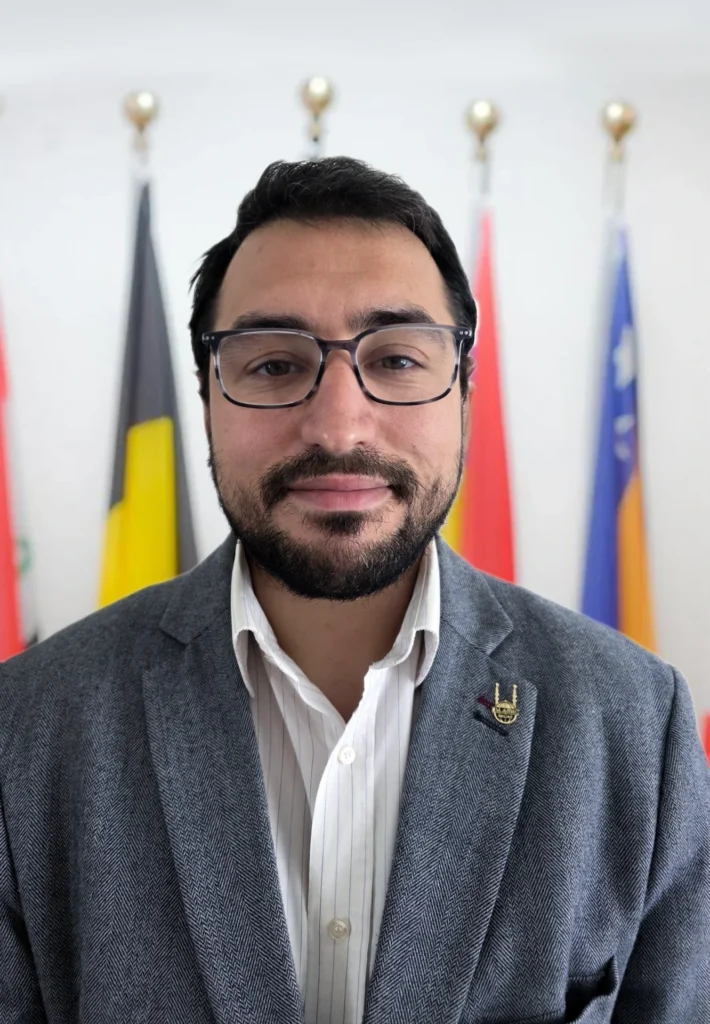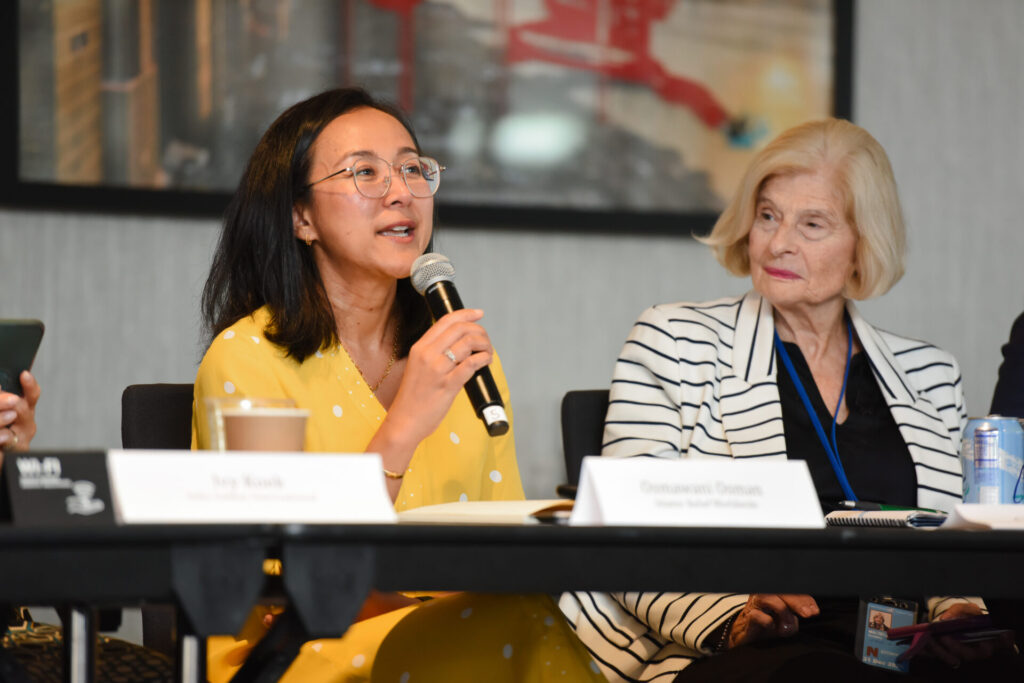
The 2025 UN General Assembly took place amid profound upheaval — from global funding cuts to eroding women’s rights and blocked humanitarian access. Islamic Relief was at the multi-lateral forum to observe and offer a vital perspective grounded in justice and field experience. Here, our International External Relations Coordinator, Osmawani Binti Osman, shares 5 key takeaways from the event.
Each September, New York becomes a hive of diplomacy, with people from around the world converging for the United Nations General Assembly (UNGA) – or “uhn-gah”, as most call it. I was there during High-level Week, representing Islamic Relief, participating in discussions, and listening closely to understand where global priorities are heading.
This year, one question stayed with me throughout the week: What does the future hold for the UN?
At 80, the UN faces deep questions about its relevance and capacity to respond to crises. For faith-based organisations like Islamic Relief, this moment of transition creates opportunities to bridge humanitarian expertise with moral frameworks rooted in justice. Here are 5 reflections I had as I left the summit:
- There is growing pushback on women’s rights
One theme that surfaced repeatedly throughout the week was the rising backlash against women’s rights. At the High-level Meeting marking the 30th Anniversary of the Beijing Declaration (a global agreement committing governments to promote women’s rights and gender equality), there was strong rhetoric.
The first female President of the General Assembly in the UN’s 80 years(!) reminded us that women’s rights are the best weapon for peace, and UN heads underscored that equity for women and girls is yet to be achieved by any country. But in parallel spaces, I saw something troubling — the language of “family values” increasingly weaponised against women’s rights.
We need to be alert here. Islamic Relief’s commitment to family values is deeply rooted in our faith — as is our commitment to women’s dignity, education, and economic empowerment. These are not in tension, they are complementary. The challenge is ensuring that legitimate faith-based perspectives on family are not conflated with regressive agendas that seek to roll back women’s rights. For Islamic Relief, clarity matters: our values call us towards justice and equity, not away from it.
- We need greater moral courage for children
Another powerful thread running through the week was the crisis facing children in conflict. In the Call to Action for Children in Gaza and the West Bank, a member-state focused event convened by Jordan, Belgium and the European Union (EU), 2 young Palestinians from Gaza spoke of their desire simply to live in safety.
It was heartbreaking. But in truth, much of the event felt scripted, with familiar outrage, but little that was new. People are tired of words without action. If there were true political will, the plight of children in conflict, like those in Gaza, would not persist.
Children’s rights were also in focus at UNICEF’s Faith Leadership Circle event on Moral Courage in a Time of Crisis for Children, where I had the chance to speak, and highlighted Islamic Relief’s work with young people and the challenge of artificial intelligence. AI technology is shaping the future, but biased data risks entrenching gender inequality for future generations unless we intervene. Faith actors like us must play a role in correcting these trends and ensuring that children are protected in practice.
- Humanitarian diplomacy is under strain
Whether in Gaza, Sudan, Myanmar or Yemen; whether by attacks, bureaucratic impediments, or sanctions, humanitarian diplomacy is under strain.
“Aid is lifesaving, but it can’t replace political solutions,” one speaker at an event on Humanitarian Diplomacy in Action: Collective Response to the Crises in the Middle East, co-hosted by Saudi Arabia, the EU and others, said.
The message was blunt: access is being deliberately blocked, not simply withheld. It was clear that the world doesn’t need more statements of concern, we need pressure applied in the right places, and states to take responsibility for violations of international humanitarian law.
For Islamic Relief, this was an important reminder of why our presence at UNGA matters. These discussions shape whether aid workers are protected, whether civilians are shielded, and whether humanitarian access is respected. Being at the table strengthens the collective advocacy for vulnerable communities, reminding policymakers that inaction is also a choice and it can cost lives.
- Reform fatigue and the next Secretary-General
UNGA80 saw the launch of UN80 reforms, which a UN official explained were a different and separate process from previously announced austerity cuts and staffing reductions. Talking to diplomats – some of whom I’ve worked with before on the UN Revitalisation Committee or past reform processes like the 2005 World Summit Outcome, the Delivering as One initiative, and the 2030 Agenda review. I heard the same weary grumble: “It’s another one. It won’t fix the system.”
Everyone is tired of UN reforms that lead nowhere. The political will is missing, especially when real change depends on the Permanent Five (P5), letting go of outdated systems. One point came through clearly in these conversations: the choice of the next secretary-general will be critical (the process of selecting a secretary-general is often compared to a papal conclave – ballot papers are white and red although no smoke signals are used).
And yet, the United Nations Security Council’s veto system means that the decision will never be purely merit-based. Whoever takes the role must be acceptable to the P5, particularly Russia, China, and the United States, thus underscoring the political realities the UN still operates under. Despite the difficulties, we shouldn’t abandon the multilateral system; we must keep pushing and speaking out, because, flawed as it is, there is no alternative.
- Why humanitarian insights are important in multilateral forums
The week highlighted why organisations with direct field experience are important contributors to multilateral conversations. We bring a perspective that combines humanitarian expertise with the moral clarity of faith.
UNGA is attended by powerful decision-makers from around the world, so it’s essential that we use these gatherings to forge networks so that we can fight for the communities and individuals we support more effectively.
I engaged with the African Union chair’s delegation from Angola, spent time with Malaysian diplomats, and connected with representatives from the UK, Canada, UNICEF, UNOCHA, UNAOC, WFP and many others. I also met with specialists such as the UN’s new Special Adviser on Genocide Prevention, whose work is particularly relevant after last month’s Commission of Inquiry report on Gaza.
Reform alone won’t fix the UN, and the discussions in New York conference rooms can feel very removed from the challenges facing the world’s most vulnerable people. But being at the table allows Islamic Relief to bring a faith-based perspective rooted in justice and human dignity and grounded by our experiences working with communities all over the world. It helps us keep the voices of those we serve at the heart of international decision-making.
BROWSE OTHER OPINIONS
FEATURED OPINIONS
- Saving our home: Time for urgent action on World Environment Day
- Gaza one year on: Endurance and exasperation
- Away from the headlines there is an opportunity for real climate action
- How the Core Humanitarian Standard guides and inspires my safeguarding work
- Leave in Hope: the end of the Bonn conference
MOST POPULAR TOPIC
View More
